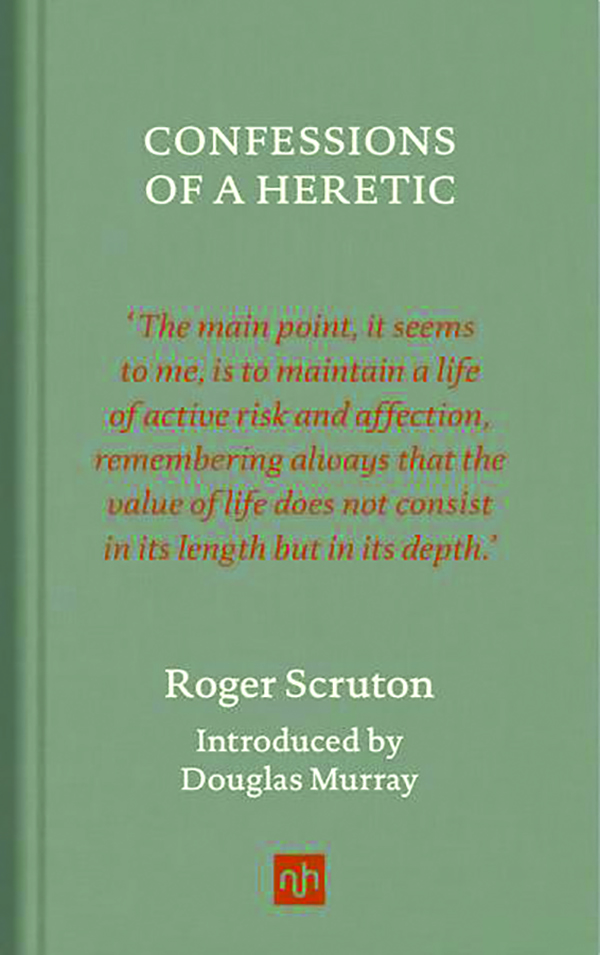The conservative philosopher Roger Scruton (1944–2020) endeavored to rebuild what the modern ideological mind has so ruthlessly and effectively demolished. The essay collection Confessions of a Heretic, recently republished in a revised version by Notting Hill Editions, provides an excellent entry into Scruton’s thinking, including his ideas about how to recover and reaffirm permanent truths about the human condition.

In a new introduction, the journalist Douglas Murray asks what it meant for Scruton to refer to himself as a “heretic.” He was white, male, conservative, heterosexual, and Anglican. Surely, he was deeply embedded in the structures of power that have defined England for centuries. Yet, as Murray recalls, Scruton was actually chased from U.K. academia for daring to investigate leftist thought and having the temerity to affirm England as England. Scruton’s eviction from conventional academic life, however, spurred his intellectual creativity and his efforts to educate others, benefitting readers and students on multiple continents.
Murray recalls that one of Scruton’s core strengths was his ability to relate an enduring norm to a deep longing in the human soul. Typically, inherited norms are derided by liberal thinkers as irrational, insular, or even bigoted. As an example, Murray cites Scruton’s defense of national loyalty as an expression of the human need for belonging, for something that is ours and that we hold in common with others. Love of one’s nation, according to Scruton, is not about dominating others but about expressing one’s love for the land, the law, and the traditions of our particular patch of earth. It unites us with our fellow citizens in the present and connects us to those who have come before us. No one, by contrast, gets sentimental about the European Union.
Scruton, however, is not what we in the United States would call a “movement” conservative. American conservatives have typically been satisfied to oppose big government, central planning, and egalitarian social engineering. Compared to our European cousins, we have done relatively little serious thinking about culture, art, literature, architecture, and community design and organization, among other subjects that are near to Scruton’s heart. Not that we are wrong to regard the size and power of government as excessive, but as Scruton is at pains to argue, the conservative must build on a greater collection of goods. We need prosperity, yes, but we also need beauty and order.
Scruton speaks not only to conservatives but also to all of those who sense that our age has left us with a void at the center of our collective life, which must be filled by rededicating ourselves to harmonious living rather than to frenetic action, work, and diversion. As Scruton argues in the essay “Faking It,” our need for authentic art, and the beauty, form, and redemption that comprise it, is a product of our moral nature, not a relative matter of taste. Beauty connects our real but incomplete longings with their fulfillment: “We create a realm of the imagination, in which each beginning finds its end, and each fragment is part of a meaningful whole.” Beauty is both “redemption” and “the face of love” shining into our lives. This means, according to Scruton, that it is precisely in darkness and oppression that tremendous works of art emerge “as a redemptive presence in our lives.” Scruton here points toward the inconvenient question for much of modern thought: What does it mean that our suffering can be redeemed by beauty and divinity? That an undefinable truth can make us whole?
In a brief essay “Effing the Ineffable,” Scruton points to the limited experiences we are sometimes given of divinity, of the whole that we cannot define. This is when our reason runs out, when our notions of cause and effect are eclipsed by God and by the awareness that this world points beyond itself. We then know ourselves for the first time, how limited we are and how complete we can become. But such moments are fleeting — as they should be, according to Scruton. We are time-bound creatures who can only briefly glimpse beyond ordinary life into the eternal.
Other essays in this collection deal with more practical concerns. In ”Hiding behind the Screen,” for instance, Scruton delivers a succinct takedown of social media. He argues that the online world, which constantly threatens to become the real one, undercuts freedom, personhood, and accountability under the guise of proliferating connectivity. Online, we feel less accountable to others because we interact with an avatar rather than a whole person who is a member of a community and embedded in a specific place. We should not be surprised, therefore, at the remarkable perversions and crudities that thrive on social media.
Scruton also offers an eloquent defense of our shared civilization. The essay “Defending the West” opens with the observation that “the citizens of Western states … have lost confidence in their way of life, and indeed are no longer sure what that way of life requires of them.” Scruton then explains the supreme achievements — he mentions citizenship, nationality, Christianity, irony, self-criticism, representation, and associational freedom — that have made our civilization so prosperous, peaceful, and voluntarily ordered. It has only been when we’ve foregone these that we’ve known misery and strife. We need not be blindly chauvinistic in order to take pride in this inheritance.
Scruton’s counsel, finally, is to live a life of depth and love, to give yourself generously to others in the things that count. Few academics and writers have followed that advice as well as Scruton did himself. In this slim volume, Scruton clears the ground for us to plant seeds of civilizational renewal generously.
Richard M. Reinsch II is the editor of Law & Liberty and the host of LibertyLawTalk. Follow him on Twitter @Reinsch84 .
